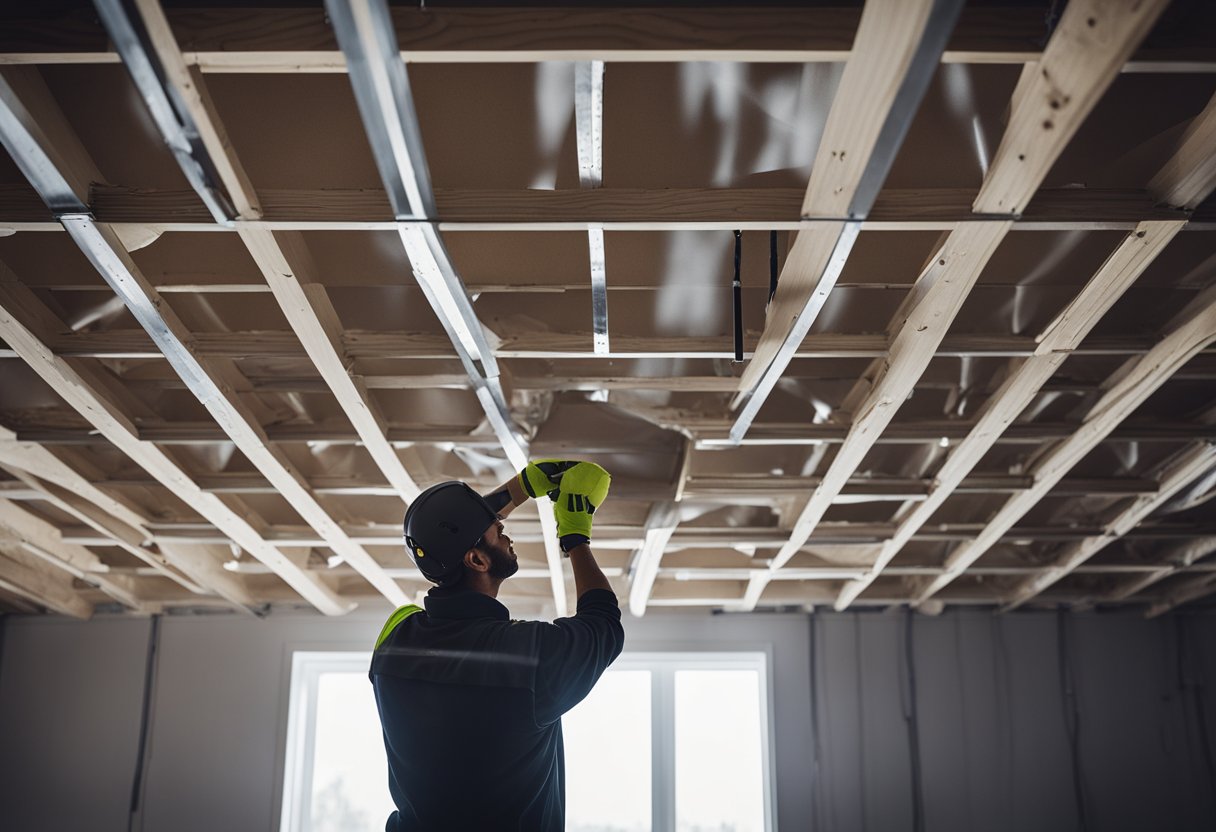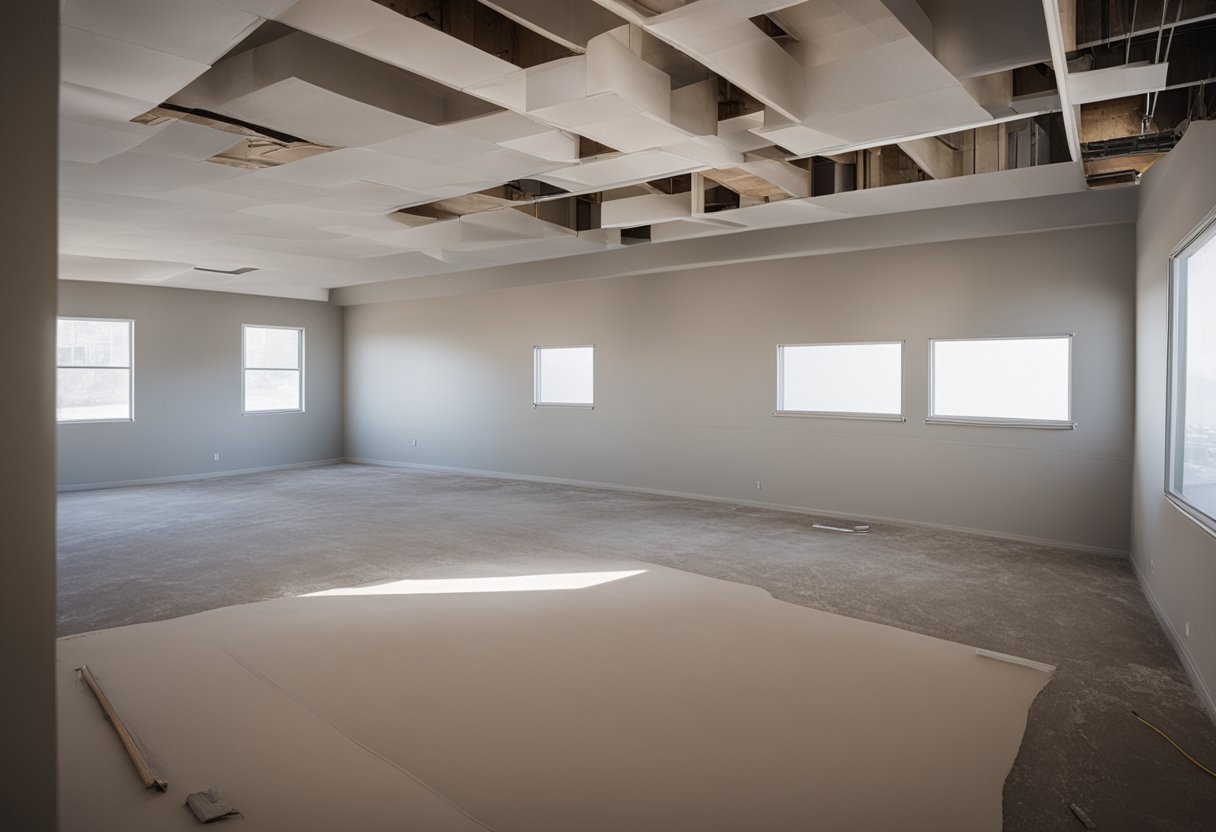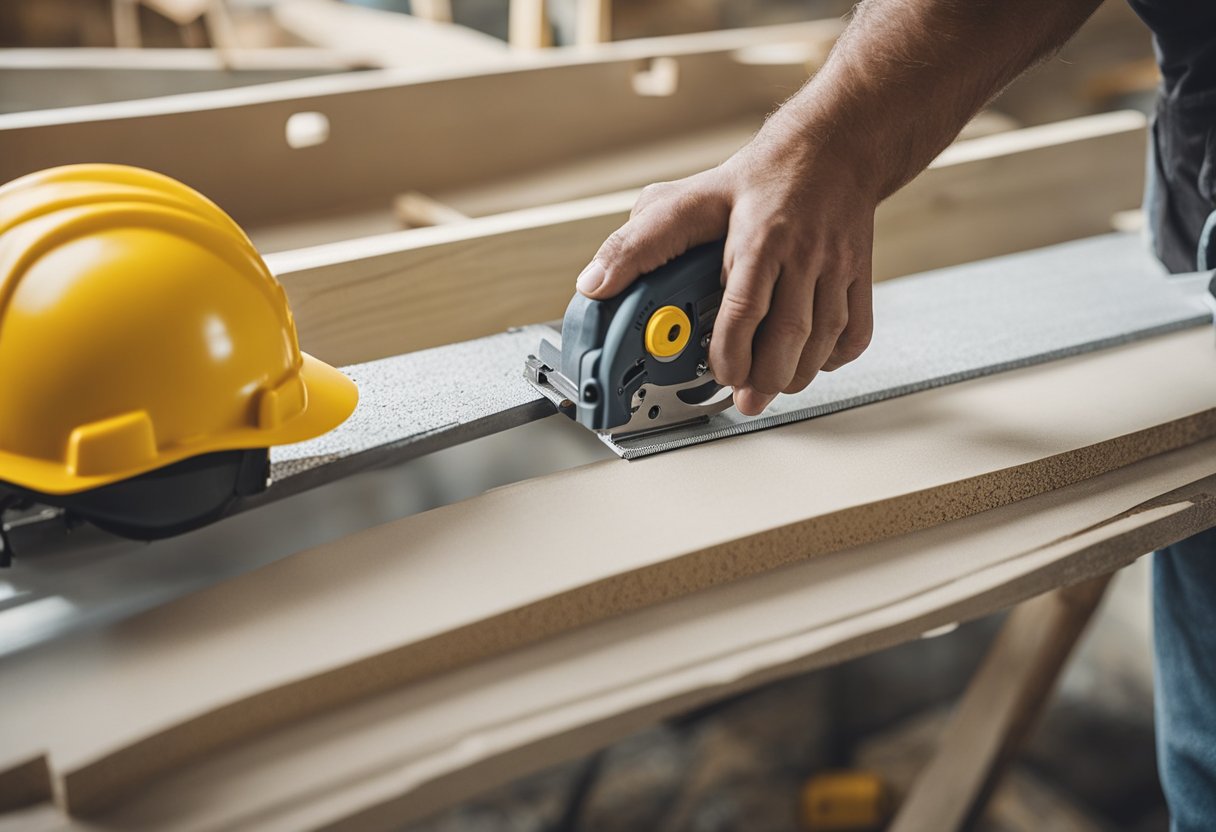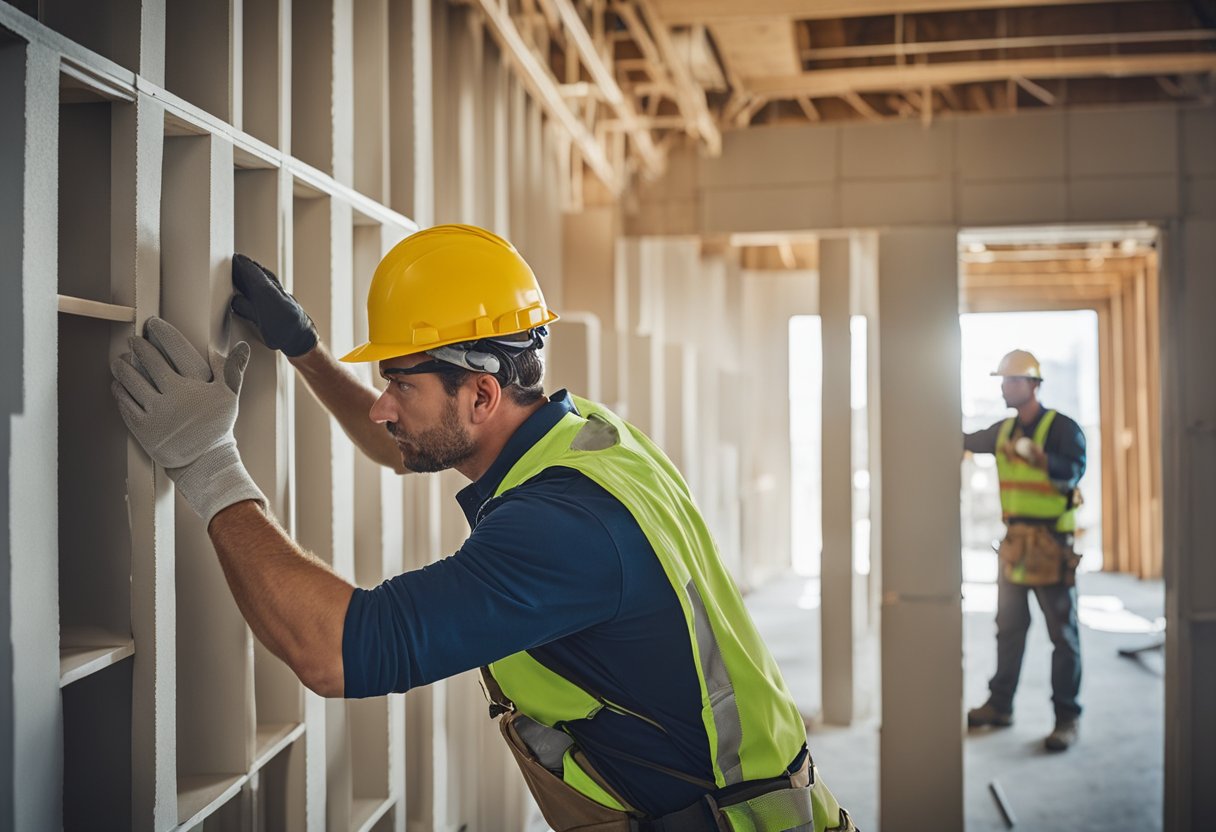As an experienced contractor, I have found that one of the most common questions asked by homeowners and builders is when is 5/8 drywall required? 5/8 drywall is a type of thick drywall that is 5/8 inch thick and provides rigidity to walls and ceilings. It is heavier and denser than standard 1/2 inch drywall, making it more resistant to damage and better suited for certain applications.
Understanding when 5/8 drywall is required is essential for any construction project. There are specific applications and building codes that require the use of 5/8 drywall, and failing to follow these requirements can result in costly fines and delays. In this article, I will provide a comprehensive guide to when 5/8 drywall is required, its applications, and how to install it properly. By the end of this article, you will have a clear understanding of when to use 5/8 drywall and the benefits it provides.
Key Takeaways
- 5/8 drywall is required for specific applications and building codes.
- It provides increased rigidity and resistance to damage.
- Proper installation of 5/8 drywall is essential to meet building code requirements and ensure the structural integrity of your construction project.
Understanding 5/8 Drywall
https://www.youtube.com/watch?v=Pfp4jnxsdfw&embed=true
As a professional contractor, I have worked with different types of drywall over the years, including 5/8 drywall. 5/8 drywall is a type of gypsum board that is 5/8 inches thick and is commonly used for walls and ceilings in commercial and residential construction. In this section, I will explain the key features of 5/8 drywall, including its thickness, weight, length, and width.
Thickness
5/8 drywall is thicker than other types of drywall, such as 1/2 inch and 3/8 inch. This thickness provides added strength and durability, making it ideal for high-traffic areas and for use in fire-rated assemblies. It is also used in areas where sound transmission needs to be minimized.
Weight
5/8 drywall is heavier than other types of drywall due to its thickness. The weight of 5/8 drywall varies depending on the manufacturer, but it typically weighs around 2.5 pounds per square foot. It is important to consider the weight of 5/8 drywall when planning a construction project, as it may require additional support or framing.
Length and Width
5/8 drywall is available in standard lengths of 8, 10, 12, and 14 feet. The width of 5/8 drywall is typically 4 feet. It is important to note that 5/8 drywall is not available in all lengths and widths, so it is important to check with your supplier to determine availability.
Gypsum Board
5/8 drywall is made of gypsum board, which is a type of mineral that is mined from the earth. Gypsum board is a popular material for construction due to its fire-resistant properties and ease of installation. Gypsum board is also known as drywall, sheetrock, or plasterboard.
In conclusion, 5/8 drywall is a popular material for construction due to its added strength and durability. Its thickness, weight, length, and width vary depending on the manufacturer, so it is important to check with your supplier to determine availability. 5/8 drywall is made of gypsum board, which is a type of mineral that is mined from the earth.
Applications of 5/8 Drywall
https://www.youtube.com/watch?v=2eDYnqcSeP4&embed=true
As a professional contractor, I have seen 5/8 drywall used in a variety of applications. This type of drywall is thicker and more rigid than other types, which makes it ideal for specific projects.
One of the most common applications of 5/8 drywall is for walls and ceilings in garages. Building codes often require fire-rated drywall in garages that share a common wall with living spaces. 5/8 drywall is a popular choice for this application because it provides extra protection against fire and can help prevent the spread of flames.
Another common use for 5/8 drywall is in remodeling projects. If you are removing old drywall and replacing it with new material, 5/8 drywall can be a good choice. It is thicker than standard 1/2 inch drywall and can help improve sound insulation and prevent moisture from seeping through.
In addition to garages and remodeling projects, 5/8 drywall is also commonly used in commercial buildings. It is often required in areas where fire resistance is important, such as stairwells, elevator shafts, and mechanical rooms.
Overall, 5/8 drywall is a versatile material that can be used in a variety of applications. If you are unsure whether 5/8 drywall is the right choice for your project, consult with a professional contractor or building inspector to ensure that you are meeting all local building codes and safety requirements.
5/8 Drywall in Construction
https://www.youtube.com/watch?v=FDGnNrvGPI8&embed=true
As a professional in the construction industry, I have come across many projects that require 5/8 drywall. 5/8 drywall is a specific type of drywall that is thicker and heavier than standard drywall. It is commonly used in construction projects where fire resistance and soundproofing are important factors.
In residential construction, 5/8 drywall is often required by building codes for walls and ceilings that are adjacent to garages or other areas where fire risk is high. The thicker drywall helps to prevent the spread of fire, providing an extra layer of protection for the occupants of the home.
When it comes to framing and supports, it is important to note that 5/8 drywall is heavier than standard drywall and requires additional support. The framing and joists must be strong enough to handle the weight of the thicker drywall. It is also important to ensure that the supports are spaced correctly to prevent sagging or warping of the drywall.
In some cases, 5/8 drywall may also be required for soundproofing purposes. The thicker drywall helps to reduce the amount of sound that travels through walls and ceilings, making it a popular choice for commercial buildings, music studios, and other spaces where noise control is important.
Overall, 5/8 drywall is a versatile and essential building material in the construction industry. Its fire-resistant and soundproofing properties make it a popular choice for a wide range of projects, including residential and commercial construction. When using 5/8 drywall, it is important to ensure that the framing and supports are strong enough to handle the weight of the thicker drywall.
Installing 5/8 Drywall
https://www.youtube.com/watch?v=DHxR3i6Gu4c&embed=true
When it comes to installing 5/8 drywall, there are a few things to keep in mind. First, it’s important to use the right screws or nails. Drywall screws are the most commonly used fasteners for hanging drywall, and they come in a variety of lengths. For 5/8 drywall, use 1-5/8 inch drywall screws to ensure a secure hold.
It’s also important to tape and finish the joints properly. Butt joints, where two pieces of drywall meet end-to-end, require special attention. Apply a generous amount of joint compound to the joint, then embed drywall tape into the compound. Smooth out any wrinkles or bubbles in the tape, then apply a second coat of joint compound. Repeat this process until the joint is smooth and seamless.
When installing 5/8 drywall on ceilings, it’s important to use the right fasteners. Drywall screws or nails should be spaced no more than 12 inches apart along the edges of the sheets and no more than 16 inches apart in the field of the sheet. This will ensure that the drywall is securely fastened and won’t sag over time.
In addition to using the right screws and tape, it’s important to make sure that the drywall is properly supported. This means using framing members that are spaced no more than 16 inches apart. If the framing members are spaced further apart, additional blocking or furring strips may be required to provide adequate support.
Overall, installing 5/8 drywall requires attention to detail and the right tools and materials. By following these tips and techniques, you can ensure a professional-looking finish that will stand the test of time.
5/8 Drywall and Building Codes
https://www.youtube.com/watch?v=ZEwhBHFGQtw&embed=true
As a homeowner or contractor, it is essential to understand when 5/8 drywall is required. Building codes are put in place to ensure the safety of the occupants and the building itself. Therefore, it is crucial to adhere to the code requirements when installing drywall.
The International Residential Code (IRC) and the International Building Code (IBC) are the primary building codes used in the United States. These codes set the standards for the minimum requirements for building materials, including drywall.
According to the IRC, 5/8-inch thick drywall is required in certain areas of a building. For example, any wall or ceiling that separates a garage from living space must be covered with 5/8-inch thick drywall. This is because the drywall acts as a fire barrier, preventing flames and smoke from spreading from the garage to the living space.
In addition, the IRC requires 5/8-inch thick drywall in stairwells and any other vertical shafts that are more than 24 inches wide. This is to prevent the spread of fire and smoke between floors.
It is important to note that local building codes may have additional requirements or exceptions to the IRC and IBC. Therefore, it is crucial to consult with local building authorities to ensure compliance with all applicable codes.
In summary, the IRC and IBC require 5/8-inch thick drywall in certain areas of a building for fire safety purposes. It is essential to adhere to these codes and consult with local authorities to ensure compliance.
Fire and Water Resistance of 5/8 Drywall
As a professional contractor, I often get asked about the fire and water resistance of 5/8 drywall. I always recommend using 5/8 drywall in areas where fire and water resistance are a concern.
5/8 drywall is classified as Type X, which means it has a fire-resistance rating of at least one hour. This rating is achieved by adding glass fibers and other non-combustible materials to the gypsum core of the drywall. In addition, 5/8 drywall is thicker and heavier than standard drywall, making it more difficult for flames to penetrate.
When it comes to water resistance, 5/8 drywall is not completely waterproof, but it does have some degree of water resistance. It is important to note that 5/8 drywall is not designed to be submerged in water or to withstand prolonged exposure to moisture. However, it can resist water damage from leaks or minor flooding for a short period of time.
It is worth noting that the fire and water resistance of 5/8 drywall can be enhanced by using additional products such as fire-resistant joint compound, sealant, or insulation. These products can improve the overall fire and water resistance of the wall system.
In summary, 5/8 drywall is an excellent choice for areas where fire and water resistance are a concern. Its Type X classification ensures a minimum one-hour fire-resistance rating, and its thicker and heavier construction makes it more difficult for flames to penetrate. While it is not completely waterproof, it does have some degree of water resistance, making it a good choice for areas prone to leaks or minor flooding.
Comparing 5/8 Drywall with Other Types
As I mentioned earlier, drywall comes in different thicknesses, including 1/2-inch, 1/4-inch, 3/8-inch, and 5/8-inch. While 5/8-inch drywall is the thickest, it’s not always necessary to use it in every situation.
Here’s a comparison of 5/8 drywall with other types to help you understand when it’s required:
-
1/2-inch drywall: This is the most common type of drywall used in residential construction. It’s lightweight and easy to handle, making it ideal for walls and ceilings in most rooms. However, it’s not suitable for areas that require fire-resistance or soundproofing.
-
1/4-inch drywall: This is the thinnest type of drywall available. It’s commonly used as a covering for existing walls and ceilings, but it’s not suitable for new construction or areas that require fire-resistance or soundproofing.
-
3/8-inch drywall: This is a slightly thicker version of 1/4-inch drywall. It’s suitable for walls and ceilings in areas that don’t require fire-resistance or soundproofing, such as closets and utility rooms.
-
Regular drywall: This is the most common type of drywall used in residential construction. It’s available in 1/2-inch and 5/8-inch thicknesses and is suitable for walls and ceilings in most rooms.
-
Standard drywall: This is a type of drywall that has been treated with a fire-resistant coating. It’s available in 1/2-inch and 5/8-inch thicknesses and is suitable for walls and ceilings in areas that require fire-resistance, such as garages and furnace rooms.
-
Lightweight drywall: This is a type of drywall that’s lighter than regular drywall. It’s available in 1/2-inch and 5/8-inch thicknesses and is suitable for walls and ceilings in most rooms. However, it’s not suitable for areas that require fire-resistance or soundproofing.
In summary, 5/8-inch drywall is the thickest and most rigid type of drywall available. It’s commonly used in areas that require fire-resistance and soundproofing, such as shared walls between apartments or townhouses. However, it’s not always necessary to use 5/8-inch drywall in every situation. The type of drywall you choose will depend on the specific needs of your project.
Cost Considerations for 5/8 Drywall
As with any construction material, cost is a major consideration when choosing 5/8 drywall. While 5/8 drywall is typically more expensive than thinner drywall options, it is often required for specific applications where added strength and fire resistance are necessary.
When considering the cost of 5/8 drywall, it’s important to take into account both the price per panel and the amount of waste that may be generated during installation. While 5/8 drywall is more durable and less prone to damage than thinner options, it is also heavier and more difficult to cut, which can lead to more waste during installation.
In terms of pricing, according to Bob Vila, the typical cost of 5/8 drywall is between $12 and $20 per panel, with a national average of $15. However, it’s important to note that pricing may vary based on location, supplier, and other factors.
While 5/8 drywall may be more expensive than thinner options, it is often required for specific applications where added strength and fire resistance are necessary. When considering the cost of 5/8 drywall, it’s important to take into account both the price per panel and the amount of waste that may be generated during installation.
Benefits of 5/8 Drywall
As a construction material, 5/8 drywall is a popular choice for many reasons. Here are some of the benefits of using 5/8 drywall:
1. Durability
5/8 drywall is thicker and more durable than standard 1/2 inch drywall. This makes it ideal for areas that are prone to wear and tear, such as high traffic hallways or commercial buildings. It is also less likely to crack or break under stress.
2. Sagging Resistance
Due to its thickness, 5/8 drywall is less likely to sag over time. This is especially important for ceilings, where sagging can be unsightly and even dangerous. Using 5/8 drywall can help ensure a smooth and level ceiling that will last for years.
3. Insulation
5/8 drywall is a great choice for insulation. It has a higher R-value than standard 1/2 inch drywall, which means it is more effective at keeping heat in or out of a building. This can help reduce energy costs and make a building more comfortable to live or work in.
4. Fire-Resistant Panel
5/8 drywall is also a fire-resistant panel. It can help slow the spread of fire and protect the building and its occupants. This is especially important for commercial buildings, where fire safety is a top concern.
5. Wall-Board
Lastly, 5/8 drywall is a great wall-board. It is thick enough to provide a solid surface for mounting heavy items such as shelves or cabinets. Additionally, it is easy to cut and install, making it a popular choice for DIYers and professionals alike.
Overall, 5/8 drywall is a versatile and durable material that has many benefits. It is a great choice for areas that require extra strength, insulation, or fire resistance.
Frequently Asked Questions
What is the difference between 1/2 and 5/8 drywall?
The main difference between 1/2 and 5/8 drywall is their thickness. 5/8 drywall is thicker and heavier than 1/2 drywall. While both types of drywall can be used for walls and ceilings, 5/8 drywall is typically used for ceilings and walls that require additional fire resistance.
Is 5/8 drywall necessary for soundproofing?
While 5/8 drywall is thicker and heavier than 1/2 drywall, it is not necessarily required for soundproofing. However, it can be more effective at reducing sound transmission due to its increased mass. Other factors, such as insulation and sealing gaps, are also important for effective soundproofing.
What are the drywall requirements for kitchens?
In general, 1/2 inch drywall is suitable for most kitchen walls and ceilings. However, some local building codes may require 5/8 inch drywall for fire resistance. It is important to consult local building codes and regulations to determine the specific requirements for your kitchen.
Is drywall required on ceilings?
In most cases, drywall is required on ceilings. It provides a smooth and fire-resistant surface that can be easily painted or finished. However, some ceiling materials, such as plaster, may be used instead of drywall.
Can 1/2 inch drywall be used on ceilings?
Yes, 1/2 inch drywall can be used on ceilings. However, 5/8 inch drywall is recommended for ceilings that require additional fire resistance, such as garages or shared walls between units.
Do garages require 5/8 drywall?
Garages that are attached to living spaces typically require 5/8 inch drywall for fire resistance. This is to prevent the spread of fire from the garage to the living space. It is important to consult local building codes and regulations to determine the specific requirements for your garage.

Hi, I’m Sal Muller of Tooltrip.com. My DIY experience led me to understand essential power tools for home projects. Tooltrip.com guides enthusiasts and professionals in choosing right tools for any job. I provide concise top tool reviews for easier, efficient DIY.







